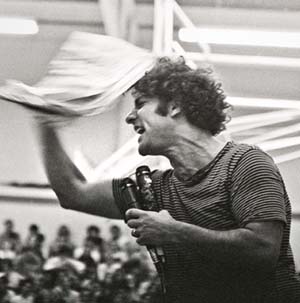 |
 |
| current issue |  | past issues |  | send a letter/news |  | address update |  | advertise |  | about us |  | alumni home |
Features
Riot ActPage: < Prev 1 2 3 4
It was a mild, damp spring evening. By 7 p.m. there were 4,000 to 5,000 people jammed into the gym. Fire marshals ordered the doors locked. At least 2,500 more people waited in the field outside, where the speeches would be heard on loudspeakers. If there had been no statewide brouhaha and especially if there had been no Cambodia-Kent State (as those days would forever be shorthanded), the crowd surely would have been smaller. But the event gave some focus, some action, to a time of deep grief, anger, fear and helplessness.
"To be in the same room on approximately the same wavelength with these rabble rousers, these icons, was like the cavalry coming to help out your side," says Wayne Worcester '70, who still has on his office wall at the University of Connecticut, where he teaches journalism, a framed photo of Abbie Hoffman shouting into UNH microphones.
By the time the Chicago Three arrived, it was close to 8 p.m. Dellinger, dressed in a suit, apologized for the delay, noting they had been stopped by police on the way. Actually, they were stopped by two different police units and questioned for about 20 minutes before being offered a police escort to the Field House. Dellinger gave what Wefers describes as a "brilliant and interesting" talk, occasionally responding to the audience's cheers with "Right on!" Then Hoffman and Rubin took the microphone for performances that sparked more laughter then anger. "It was like a comedy concert," says Wefers.
Hoffman, who had already attempted a handstand on his chair after taking the stage, threw himself physically into his speech. "Tonight the Granite State is going to crack!" he yelled, bringing his arm in a wide swing from above his head to the floor. "Tonight, the Old Man in the Mountain is going to blow his m----- f------ brains out!" He "used the four-letter word for intercourse more than 100 times," the Union Leader later reported. He also, memorably, referred to the Washington Monument as "the petrified penis on the Potomac."
 Abbie Hoffman of the Chicago Three. |
Rubin ranted about college being "an advanced form of toilet training." He insisted the night was not about free speech, but about power, and urged students to keep using that power to close down the university and end the war. But he probably got the loudest reception when he lit a joint on stage, sharing it with Hoffman, who, according to some alumni who were there that night, offered to share it with the crowd.
And then it was over. The Chicago Three, standing in a soft drizzle, took a few minutes to talk with the people who couldn't get into the Field House and then were driven by Riviere back to Boston. The National Guard went home. The students went home. There were no riots; not even a broken window.
Not that the campus returned to normal that semester. The next night a silent candlelight march attracted thousands of students. Then, as hundreds of universities and high schools across the country closed their doors in response to strike threats by students, UNH went on strike, in its own way. Academic departments—beginning with philosophy, followed quickly by mathematics—voted to actively support a strike. So did the University Senate. A publication called the Strike Daily listed dozens of open workshops being offered by UNH faculty and students. Faculty and students also worked together on how to handle grades and graduation. President McConnell went out of his way to note that while business was not "as usual," students were still engaged in learning.
In fact, throughout the late 1960s, protests at UNH tended to be constructive—and successful. Low-income single mothers enrolled at the university demanded on-campus childcare, and got it. A program to recruit African-American students and faculty was instituted through the combined efforts of students and faculty. Students campaigned for and won the right to visit dorm rooms belonging to the opposite sex.
As Rudman had promised, Wefers was tried—and convicted—for criminal contempt of court. But his conviction was overturned on appeal in December. Today he has kind words for Rudman, McConnell and Walter Peterson '46, who was governor at the time. After Kent State, he says, "they could have locked up the Field House, turned off the electricity and shutdown the mike. At the end of the day, free speech was alive and well in Durham."
When the Granite yearbook came out for the Class of 1970, its cover featured a high-contrast black-and-white montage of T-Hall in flames. Fake flames, of course. But symbolic—and rather surreal. ~
C.W. Wolff is a freelance writer who lives in Kittery, Maine.
Where Are They Now?
Online at http://unhmagazine.unh.edu/sp10/then_and_now.html with photos and updates. Also information about "Mayflowers," a 1972 documentary about the Chicago Three visit and the student strike by Gary Anderson '69, who has just released an expanded 40th-anniversary edition on DVD.
Page: < Prev 1 2 3 4
Easy to print version
blog comments powered by Disqus
